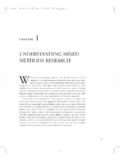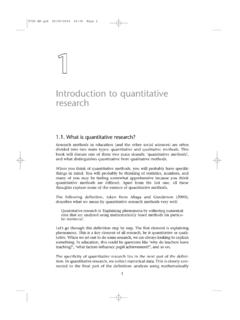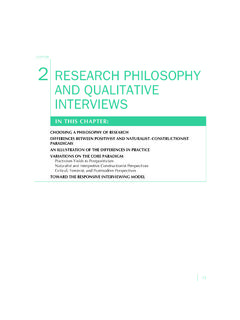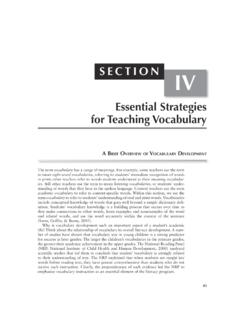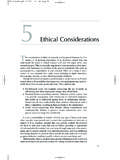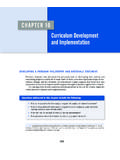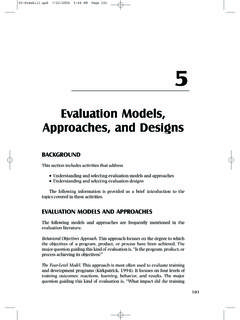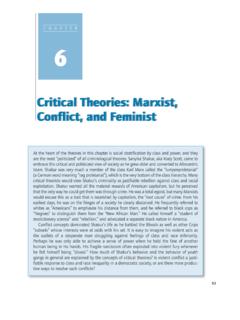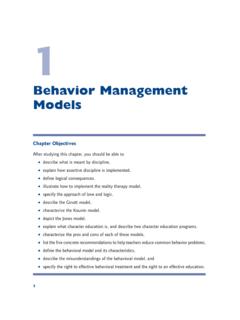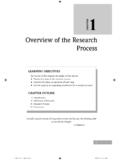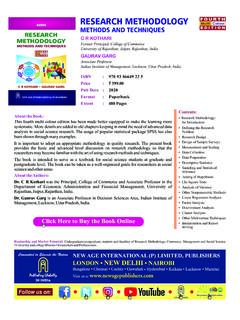Transcription of POSITIVIST RESEARCH Chapter objectives
1 8708 31/08/2009 10:23 Page 9. POSITIVIST RESEARCH . Chapter objectives To develop an understanding of the POSITIVIST RESEARCH paradigm To consider the relationship between POSITIVIST RESEARCH , quantitative methodology and experimental methods To outline the possibilities and limitations of POSITIVIST RESEARCH In this Chapter , we will look at what is meant by POSITIVIST RESEARCH , and consider how a POSITIVIST approach to RESEARCH leads to the use of experimental and quantitative meth- ods. We will also be introducing you to the idea of RESEARCH paradigms. This is important because carrying out RESEARCH involves an understanding of the philosophy that under- pins the RESEARCH or paradigm' because this, in turn, determines the methodological approach taken. Positivism tends to underpin quantitative methodological approaches to RESEARCH as we will see.
2 FINDING OUT ABOUT THE WORLD AROUND US. By the time we reach adulthood we know a lot of things, not only facts about the world around us, such as how to peel a banana and the age that children usually begin to walk, but we also have ideas and opinions on many topics. The branch of philosophy that looks at what knowledge is (its nature), the source of knowledge and the validity of knowl- edge, is called epistemology. Johnson and Christensen (2008) identify three sources of knowledge: experience, expert opinion and reasoning. Experience This is the first way that babies begin to learn about the world around them, as they explore the world via their senses. The idea that knowledge comes from experience is known as empiricism (Atkinson et al., 1996) and according to this way of thinking only the knowledge that we obtain through our senses can be said to be true.
3 From this con- cept is derived the word empirical', the idea that a statement can be proved or disproved by observation, experiment or experience (Johnson and Christensen, 2008). Later on in the Chapter we will see that POSITIVIST methodology relies on the collection of empirical 8708 30/08/2009 20:33 Page 10. 10 RESEARCH methods in Early Childhood data; facts or information that has been derived by observation or experiment. Expert opinion The sum total of human knowledge would not grow very fast if we had to formulate our knowledge and understanding of the world by first principles' all the time. Much of our knowledge has been passed down to us from others. Among the sources of information are our parents, other family members, friends, educators and experts'. It is difficult to turn on the television or read a newspaper without encountering the ideas of experts.
4 As we grow older we come to realise that not everything that we are told by experts is true or helpful. We learn to practise discernment and realise that sometimes expert advice can be contradictory. Nevertheless, learning from others remains an important source of information about the world around us. Reasoning Whereas empiricists argue that the only valid way to find out about the world around us is by observation, experiment and experience, adherents of rationalism consider that rea- son is the primary source of knowledge (Johnson and Christensen, 2008). Through the processes of thinking and reasoning, rationalists believe that it is possible to develop an understanding of a subject, without actually directly observing a phenomenon. Atkinson et al. (1996) identify two main types of reasoning; deductive reasoning and inductive reasoning.
5 Deductive reasoning is the process of drawing conclusions about something on the basis of prior knowledge known to be true. For example, one may agree that the following statement (premise) is true: Newborn babies cannot talk.' Then, given another statement, Baby John can say DaDa''', it is possible to deduce that John cannot be a newborn baby. Deductive reasoning is only successful if the first premise is true. Inductive reasoning is when one draws conclusions about something on the balance of probability that a statement is true, based on what has previously occurred. For example, you may have noticed that every cat you have seen has a furry coat and from this you reason that it is probably true that all cats have furry coats. However, when using inductive reasoning it is always possible that the exception to the rule may come along, which will disprove the theory.
6 WHAT DO WE MEAN BY A PARADIGM'? RESEARCH is about asking questions and seeking information to answer the questions that we pose. Influencing the questions that we ask and underpinning the RESEARCH approach we eventually take are our ideas and conceptions about childhood and children. This understanding of children and childhood ultimately influences the RESEARCH paradigm that we use. It is worth taking some time to discuss what a paradigm is as it is a term that will be used frequently in this book. In common usage, a paradigm is an exemplar or a model. However 8708 30/08/2009 20:33 Page 11. POSITIVIST RESEARCH 11. the term has come to mean something more specific when used in relation to RESEARCH , mainly because of the work of Thomas Khun in the 1960s and 1970s (Hammersley, 2007). According to Mackenzie and Knipe (2006) a paradigm is a theoretical framework.
7 They cite Bogdan and Biklen (1998: 22) as defining a paradigm as a loose collection of logically related assumptions, concepts and propositions that orient thinking and RESEARCH '. Hughes (2001a: 31) describes a paradigm as a way of seeing the world that frames a RESEARCH topic' and influences the way that we think about the topic. Similarly, Fraser and Robinson (2004: 59). describe it as a set of beliefs about the way in which particular problems exist and a set of agreements on how such problems can be investigated'. From this, it is clear that our choice of paradigm is important in influencing the methodology we choose, but it also shapes our perceptions of children and childhood as we will see. Hughes (2001b) illustrates the connection between underlying beliefs and RESEARCH methodology when he looked at a number of RESEARCH studies into the influence and sig- nificance of the media in children's lives.
8 He concludes that the way that the various RESEARCH studies were conducted reflects the model of childhood held by the researchers, and that this underlying model influenced the RESEARCH that was conducted. For example, researchers who held the underlying belief that children are like little sponges', uncriti- cally absorbing messages from the media, asked the question what does the media do to children?' Researchers who saw children as more active, discriminating consumers tended to ask the question what do children do with the media?' (Hughes, 2001b: 356). Although various authors (Hughes, 2001a; 2001b; Mackenzie and Knipe, 2006) have identified a number of paradigms that underpin RESEARCH into children, Kumar (2005). suggests that the two main paradigms that form the basis of RESEARCH in the social sci- ences are the POSITIVIST approach and the naturalistic (interpretivist) approach and it is these two paradigms (as well as post-structuralism) that we will be looking at in more detail in both this Chapter and the next.
9 THE MEANING AND ORIGINS OF POSITIVISM. The POSITIVIST paradigm is one that has its roots in physical science. It uses a systematic, sci- entific approach to RESEARCH . Hughes (2001a) explains that the POSITIVIST paradigm sees the world as being based on unchanging, universal laws and the view that everything that occurs around us can be explained by knowledge of these universal laws. To understand these uni- versal laws we need to observe and record events and phenomena around us in a systematic way and then work out the underlying principle that has caused' the event to occur. An example of this process in action is the story of Sir Isaac Newton and the apple. It is said that Isaac Newton was walking in an apple orchard and saw an apple fall straight down to the ground. He started wondering about how far above the Earth the force of gravity had an effect and began to develop his theory of gravity.
10 In this example the observed event was the falling apple and the underlying universal law was that of gravity (Keesing, 2008). Scientific discoveries have been made since ancient times, for example as early as 4800. BC there is evidence that standing stones were being used for astronomical calculations in an area of Africa near the Sudanese border with Egypt (Lee, 2008). The POSITIVIST par- adigm, however, is not just associated with scientific discovery; it involves the 8708 30/08/2009 20:33 Page 12. 12 RESEARCH methods in Early Childhood application of scientific methodology. The development of the scientific method as a means of exploring the world around us probably emerged around the time of the European Renaissance (fifteenth and sixteenth centuries) and the Enlightenment (eigh- teenth century) (Fraser and Robinson, 2004).
